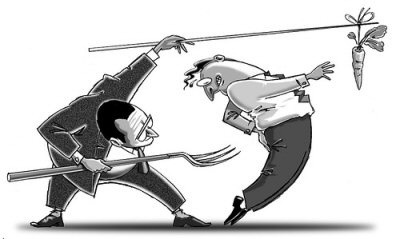“Research is at the mercy of it’s subjects.”
by calebglee
Reflections in response to @shahlock Manan Shah’s thoughtful Post on Research in Education. http://mathmisery.com/wp/2013/11/13/some-thoughts-on-edu-research/
This is just a reflection as I am no expert on these matters. I agree with your analysis regarding the wide range of variables that can affect human processes like learning. It is very difficult to pinpoint one variable that affects all people the exact same way. One of the puzzles for me is that I do believe research tends to lean toward the existence of a single variable because of mass application of similar standards and pedagogy. It is not a surprise that a certain level of conditioning could be achieved if enough people across the system are operating in a similar manner, such is the nature of a bureaucracy. This concerns me today because as we learn and adjust to a new educational landscape many students are operating under a tradition majority mental framework. I say this not in an attempt to discredit traditional education. The innovators and entrepreneurs of today are indeed a product of traditional mindset education.
So what is traditional mindset education. I could relate this to invisible fences for pets. A transmission wire is buried around the perimeter of a yard. A dog wears a receiver collar that can deliver a shock if it roams to close the transmitter wire. After several encounters the dog learns it’s boundaries and will stay in the defined area. What has the dog learned? Has it learned that the owner fears for it’s safety if it wanders too far away, or any other concerns? I would say no. All the dog has learned is that if it crosses a certain boundary it will be shocked. Due to the effectiveness of this model of training, humans have operated in this way for many years. Simply put penalties work while in many cases the lack of a penalty is considered a reward.
The biggest concern for me is the conditioning of the dog or, in education’s case, the human. After this type of training would you ever be able to retrain the dog to not fear the collar boundary? Of course the answer is yes, but not without sorting out the baggage of the previous condition. Traditional education that I speak of has as much to do with the form of discipline that is exercised in order to facilitate learning and not as much the method of content delivery. What compounds this is that those trained in this system propagate it through their personal lives as they raise their families. A child’s value base can be quickly set with the form of discipline that is used. A penalty based form will produce unconscious behavior in the defined conditions and many times in new but similar conditions. Unfortunately this mindset does not do well at all in environments of change where boundaries are often uncertain. Due to the nature of penalties and rewards the child will quickly interpret their value based on whether or not they are being penalized or rewarded (or not penalized). All of this is external and for most people seems reasonable to those raised and taught in this fashion. Let’s be honest, we do not want our kids to run out in front of speeding cars so we use this form of discipline in the moment. This however becomes a challenge when it enters the educational realm.
The 21st century problem is that creativity and critical thinking is growing in value. A penalty reward system generally does not promote behaviors that are outside the defined norms hence the dog collars example. Luckily, humans can be resilient and push through conditioning to become innovative in mindsets. Unfortunately the majority of us continue to operate in the dog collar traditional mindset thus resulting in research and solutions that seems to fit the majority well.
If education continues to use penalties and shame to motivate students our research will continue to fail in providing us new and useful learning’s that are not affected by this mindset. It appears to me that research is at the mercy of it’s subjects mindsets. The good news is that there are many educators working hard to retrain students to not value themselves based on their performance but rather to value their performance for what it adds to their lives. I am in no way suggesting that penalties have no place in education but rather the method of which they are administered must be considered. Do the penalties produce intrinsic motivation and or a learning mindset?
I like this image by Marilee Adams, PhD. from the http://www.inquiryinstitute.com. I believe it contrast intrinsic versus extrinsic effects on choice and decision making and ultimately learning.

